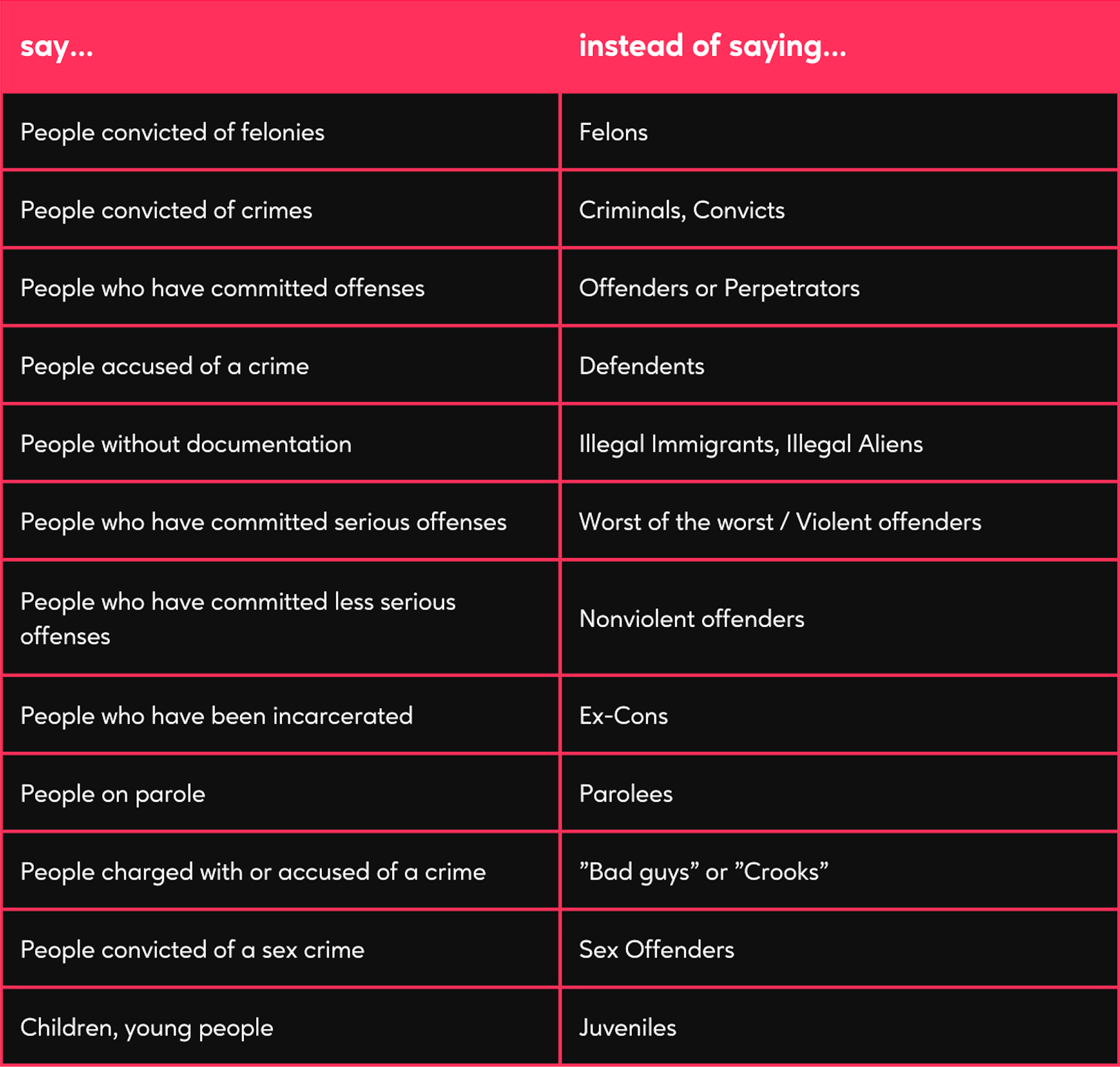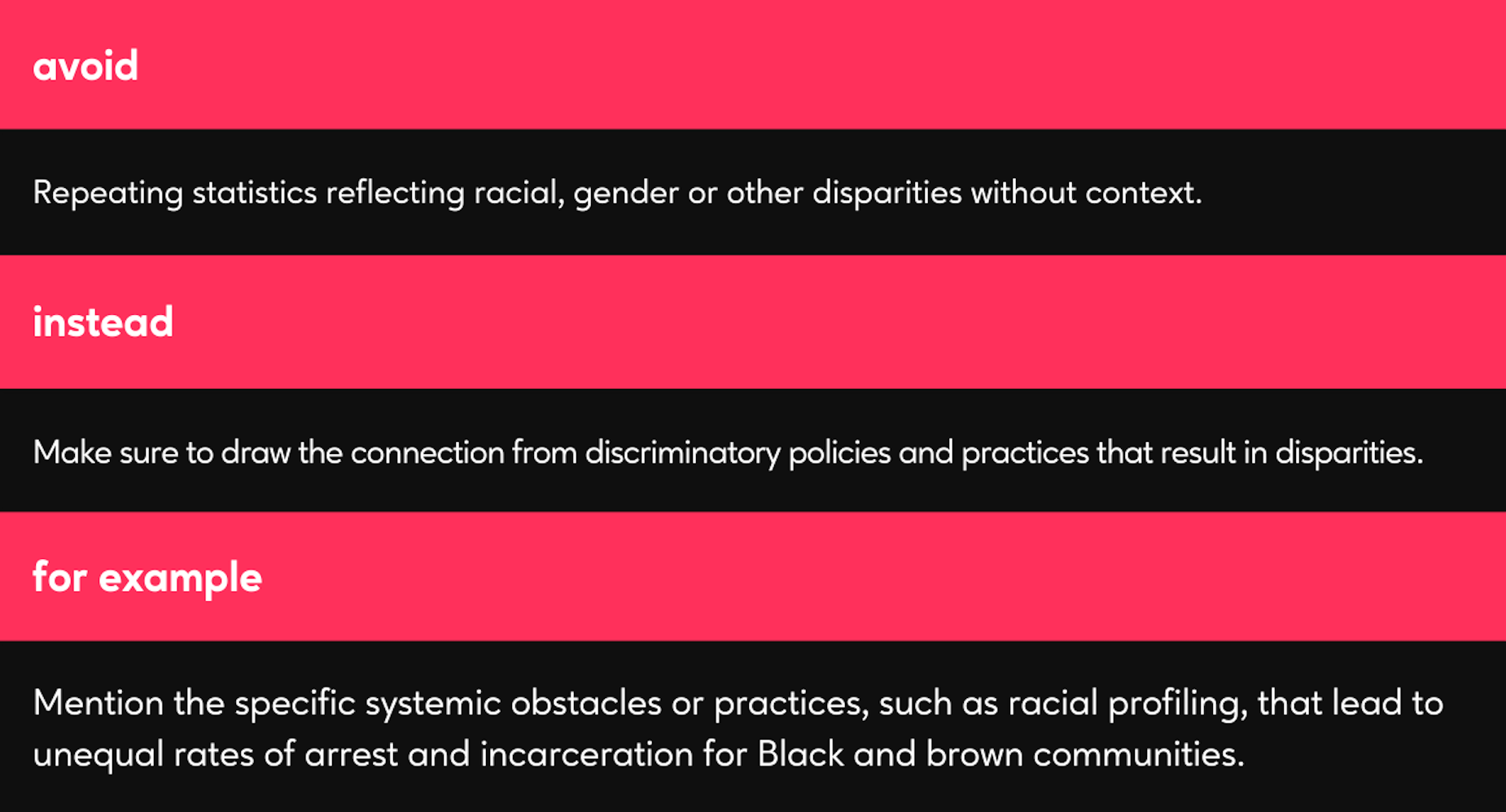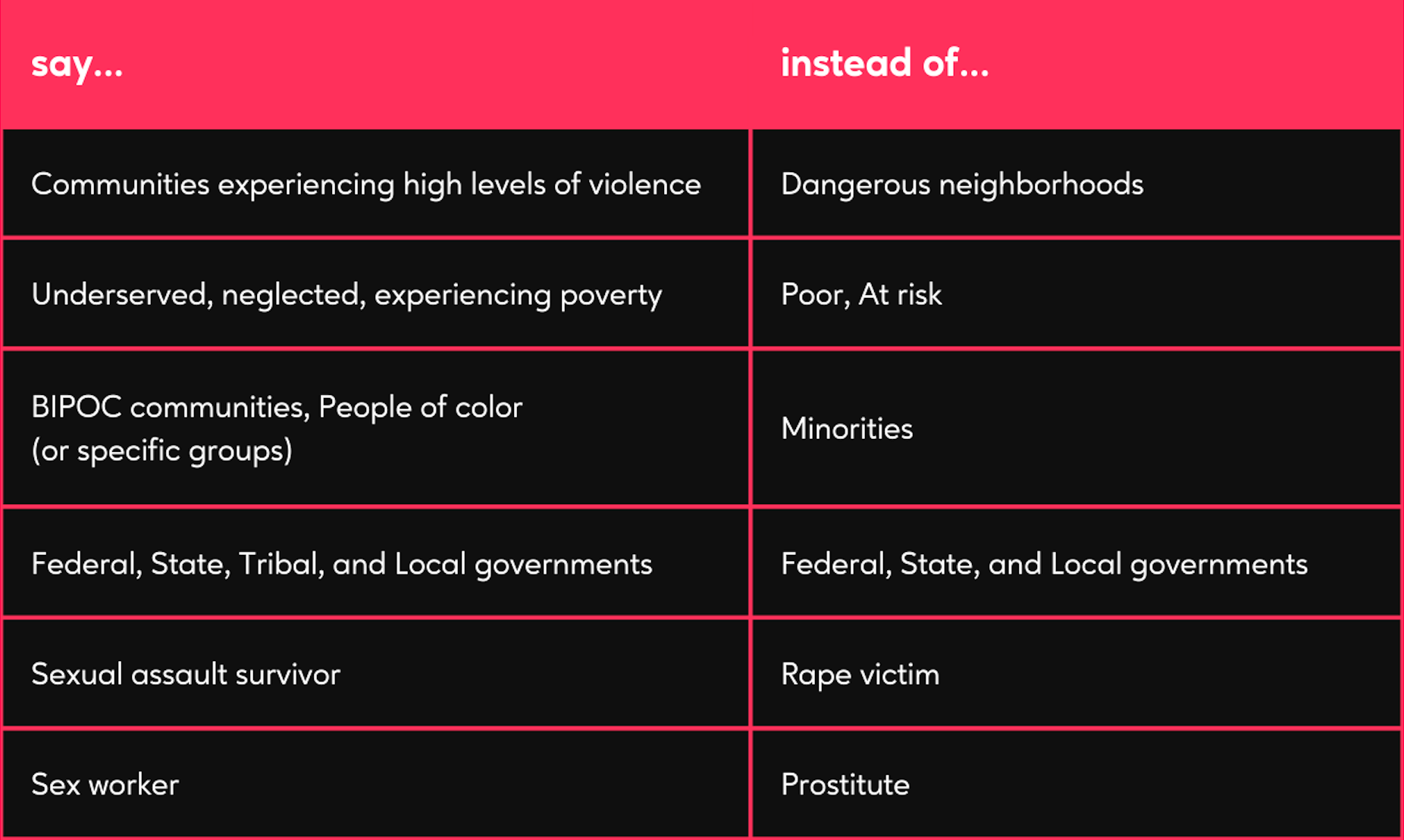Criminal Justice Reform Phrase Guide

Five Tips for Language That Changes Hearts & Minds
Momentum has grown for policymakers to improve the criminal system and adopt strategies that keep all communities safe; prevent harm; and uphold the values of fairness, equal justice, respect, and accountability. But we know that current conversations often perpetuate misconceptions, reinforce stereotypes, and hamper improvement of the system.
This tool includes tips to promote a more equitable and more accurate discourse that is respectful and effective at addressing the harms of the system.
Whether you are a public defender, legislator, community organizer, judge, professor, or communicator, adopting harmful language can impact the discourse and policies that affect people and communities.
Our words matter. The goal of this document is to provide suggestions for effective and appropriate language to move the needle toward transformation. The Opportunity Agenda welcomes your experiences, reactions, ideas, and insights.
1. People, Not Labels
The traditional language of the criminal justice system is often dehumanizing and fosters stigma, stereotypes, and fear. Instead of labels, talk about the people touched by the system; they are members of our community and nation.

For all of the above, depending on how specific the description needs to be, say: People who have been caught up in the criminal justice system.
2. Connect the Harm to Systemic Solutions
Conversations about the criminal system often respond to individual examples, which the media frequently sensationalizes. These accounts contribute to a public culture of fear about crime, and often feature individualized responses rather than systemic reform. To promote a new narrative about what community safety looks like, try to reframe the conversation and remind people that reforming the system is a path toward true community safety. We don’t need to rely on punishment and harshness to keep everyone safe.
When they say: we need more police and criminal laws.
YOU SAY: We need real community safety. That happens when we provide the resources communities need to thrive, particularly those who are suffering from a lack of investment.
When they say: violent crime is skyrocketing.
YOU SAY: Working toward real community safety will always be our priority. We know that most harms happen between people who know each other or who are family and are experiencing stressors. We encourage investment in programs that alleviate the financial and emotional burdens of the moment.
When they say: We need to return to more law and order.
YOU SAY: Safe communities mean that personal security and equal justice co-exist. We are safer when we invest in social welfare programs and community-based anti-violence programs.
When they say: X person committed this violent crime, so criminal justice reform policies should be abandoned.
YOU SAY: We have to be smart about the way we approach something as important as community safety. It makes no sense to throw out carefully considered policies that have helped so many communities based on one instance. If ever there were a time to dig deep for solutions, that time is now.
We are all safer when we look at the system as a whole; when we support people as they reenter their communities; and when we adopt policies that keep people within their social support network. We should examine criminal policies by looking at their effects on the whole system. We should not allow politicians to sensationalize individual instances to promote policies that do more damage than good.
When they say: Calls to defund policing will result in chaos.
YOU SAY: We should welcome any calls to examine a system that is causing people harm. When we take a closer look at how police interact with communities and how we can better approach community safety and prevent harm, we get closer to true community safety – our shared goal.
We can help communities become even safer by investing in programs and policies that allow them to hold individuals accountable for harm while providing alternatives to incarceration.
When they say: We need to punish people for their crimes.
YOU SAY: We know there are many ways to hold people accountable without relying on outdated or dehumanizing forms of punishment. For example, restorative justice programs have proven to provide a process of accountability while allowing people affected by harm to fully participate in the process.
When they say: Our cities will become dangerous if we don’t punish violent offenders.
YOU SAY: We can best keep our cities safe by increasing our investments in education, housing, food, access to recreation and other programs that allow people to thrive.
When they say: We need police to protect us from criminals.
YOU SAY: Whatever our perspective, our shared goals should be community safety and harm prevention. As the deaths of George Floyd and Breonna Taylor show us, we need to rethink our approach to preventing harm because police violence also makes communities unsafe. We can do this by looking at effective programs that have managed to prevent harm and support communities without relying on police.
3. Obstacles Before Outcomes
Instead of jumping straight to unequal outcomes, take the time to explain the unfair systems and inequitable treatments that lead to those outcomes. Otherwise, many audiences will inaccurately assume that unequal outcomes happen because some groups are simply more prone to crime.


4. Break Stereotypes
Antiquated language about communities and crime tends to perpetuate harmful stereotypes and drive flawed and misdirected policy. Use language that respects communities and acknowledges the disinvestment in neighborhoods and groups that contributes to higher levels of crime and violence.

5. Avoid Unnecessary and Harmful Distinctions
Public opinion research shows that most Americans support reforming the justice system and do not automatically distinguish between violent and nonviolent crimes or drug and other offenses. Avoid making those distinctions unnecessarily; these lines of demarcation can reduce support for broad-based reform of the system.

Respect People’s Voice and Choice
This phrase guide provides helpful tips for talking about issues relating to the criminal system. However, there may be instances when you are talking with communities and individuals whose preferences differ from the advice in this guide. That’s okay. Respect people’s choices and voices. Not everyone in a group is the same. Although the language from this guide builds upon organizing, advocacy, and research arguing that humanizing people most impacted by the criminal system is a step toward making the system fairer, some people might have different language preferences in certain instances. The most important thing to recognize is that people impacted by the criminal system are people, and how we talk about them affects the public discourse, narratives, and policies that impact their everyday life.
Values to uplift in your messaging:
- Preventing Harm
- Promoting Community Safety
- Accountability
- Rehabilitation
- Dignity
- Restoration
- Equal Justice
- Due Process
- Doing what works
Additional criminal justice reform communication resources:
- Alexandra Cox, The language of Incarceration. Incarceration (July 2020), doi:10.1177/2632666320940859
- Building a Narrative to Address Violence in the U.S., The Opportunity Agenda and Common Justice (2018), https://opportunityagenda.org/explore/resources-publications/building-narrative-address-violence-us
- Remembering Eddie Ellis and the Power of Language, Vera Institute of Justice, Danielle Sered, https://www.vera.org/blog/remembering-eddie-ellis-and-the-power-of-language
- The Language Project, The Marshall Project, https://www.themarshallproject.org/2021/04/12/the-language-project
- The Social Justice Phrase Guide, Advancement Project and The Opportunity Agenda, https://advancementproject.org/resources/the-social-justice-phrase-guide/
- Talking About Immigrants and the Criminal Justice System, The Opportunity Agenda (2015), https://opportunityagenda.org/explore/resources-publications/talking-about-immigrants-and-criminal-justice-system
- Ten Lessons for Talking about Criminal Justice Issues, The Opportunity Agenda, https://opportunityagenda.org/explore/resources-publications/ten-lessons-talking-about-criminal-justice-issues
- We Are People: Resources for Humanizing Language, The Osborne Association, https://www.osborneny.org/resources-for-humanizing-language
- Words Matter, The Fortune Society Reentry Education Project, https://gallery.mailchimp.com/ae6555fac44e3d725bead12cb/files/Words_matter.pdf


